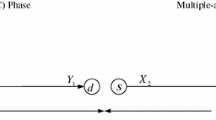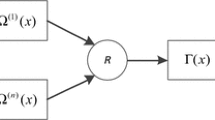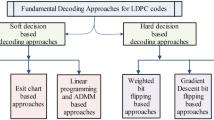Abstract
Decode and a forward (DF) protocol relay technique in cooperative communication is becoming a more attractive method to achieve a higher throughput requirement for wireless communication these days. But the high complexity operation is a major issue in the DF protocol relay processing system. The encoding operation which is a pre-processing stage of the decoding process consumes high complexity in the DF protocol relay system. Thus, it is important to tackle the encoding operation to ensure low complexity and good performance of the subsequent decoding operation in the DF protocol relay system. Thus far, very limited works have been reported on identifying a suitable encoding algorithm of encoding operation for the DF protocol relay system using the Low Density Parity Check (LDPC) code. In this paper, we present a suitable encoding algorithm for the DF protocol relay system using the LDPC code. To find out the most suitable encoding algorithm for the DF protocol relay system using LDPC code, we introduce the LDPC code encoding model. Eight different encoding algorithms based on Lower Upper and Orthogonal Upper algorithms presented in the LDPC code encoding model. The encoding execution time, the number of nonzero, and the pattern of nonzero was used to evaluate the computational complexity performance of the designed LDPC code encoding model. The most suitable encoding algorithm for the required criteria of the DF protocol relay system using the LDPC code is identified.



















Similar content being viewed by others
References
AboHashish, S. M. M., Rizk, R. Y., & Zaki, F. W. (2019). Energy efficiency optimization for relay deployment in multi-user LTE-advanced networks. Wireless Personal Communications, 108, 297–323.
Kumar, P., & Dhaka, K. (2019). Average BER and resource allocation in wireless powered decode and forward relay system. IET Communications, 13(4), 379–386.
Patil, M. V., Pawar, S. & Saquib, Z. (2020). Coding techniques for 5G networks: A review. In 3rd International conference on communication system, computing and IT applications (CSCITA) (pp. 208–213).
Suud, J., Zen, H., Othman, A. K., & Ab Hamid, K. (2018). Decoding of decode and forward relay protocol using min-sum based low density parity check system. International Journal of Communication Networks and Information Security, 10(1), 199–212.
Nguyen, T. T. B., Tan, T. N., & Lee, H. (2019). Efficient QC-LDPC encoder for 5G new radio. Electronics, 8(6), 668.
Kaji, Y. (2006). Encoding LDPC codes using the triangular factorization. EICE Transactions on Fundamentals of Electronics Communications and Computer Sciences, E89-A(10), 2510–2518.
Neal, R. M. (1999). Sparse matrix methods and probabilistic inference algorithms the parity check matrix MA summer program on codes, systems, and graphical models (pp. 1–15).
Vishnu, N. V., & Sajith, S. P. (2015). A memory efficient fully parallel QC-LDPC encoder. International Journal of Science and Research, 4(7), 323–327.
Reid, M. W. (2014). Pivoting for LU factorization. Retrieved June 11, 2017, from http://buzzard.ups.edu/courses/2014spring/420projects/math420-UPS-spring-2014-reid-LU-pivoting.pdf.
Francis, J. G. F. (1962). The qr transformation-part 2. The Computer Journal, 4(4), 332–345.
Krishnamoorthy, A. (2014). Symmetric QR algorithm with permutations. arXiv preprint arXiv:1402.5086 (Vol. 8, pp. 8–10).
Matsumura, K., & Ohtsuki, T. (2011). Orthogonal beamforming using gram schmidt orthogonalization for multi-user mimo downlink system. EURASIP Journal on Wireless Communication and Networking. https://doi.org/10.1186/1687-1499-2011-41.
Chen, F. C., Chang, R. C., Lin, C., Lin, K., & Huang, C. (2010). Iterative QR decomposition architecture using the modified gram-schmidt algorithm for MIMO systems. IEEE Transactions on Circuits and Systems I: Regular Papers, 57(5), 1095–1102.
Heath, R. W. J., Rusu, C., & Gonzalez Prelcic, N. (2016). Fast orthonormal sparsifying transforms based on householder reflectors. IEEE Transactions on Signal Processing, 64, 6589–6599.
Leung, C. S., & Cheung, K. F. (1991). Householder encoding for discrete bidirectional associative memory. IEEE International Joint Conference Neural Networks, 1, 237–241.
Merchant, F., Vatwani, T., Chattopadhyay, A., Raha, S., Nandy, S. K., Narayan, R., & Leupers, R. (2018). Efficient realization of givens rotation through algorithm architecture co-design for acceleration of qr factorization. arxiv:1803.05320 (pp. 1–12).
Faverge, M., Herrmann, J., Langou, J., Lowery, B., Robert, Y., & Dongarra, J. (2015). Mixing LU and QR factorization algorithms to design high-performance dense linear algebra solvers. Journal of Parallel and Distributed Computing, 85, 32–46.
Acknowledgements
Jamaah Suud would like to acknowledge the Ministry of Higher Education Malaysia (MoHE) for their financial support through the HLP Ph.D. scholarship scheme and Universiti Malaysia Sarawak (UNIMAS) and Kuching Polytechnic Sarawak for providing the resources to carry out this research.
Author information
Authors and Affiliations
Corresponding author
Additional information
Publisher's Note
Springer Nature remains neutral with regard to jurisdictional claims in published maps and institutional affiliations.
Rights and permissions
About this article
Cite this article
Jamaah, S., Hushairi, Z., Al-Khalid, O. et al. An Empirical Comparison of Encoding Algorithms of the Low Density Parity Check Code for Decode and Forward Protocol Relay System. Wireless Pers Commun 117, 2007–2026 (2021). https://doi.org/10.1007/s11277-020-07955-2
Accepted:
Published:
Issue Date:
DOI: https://doi.org/10.1007/s11277-020-07955-2




